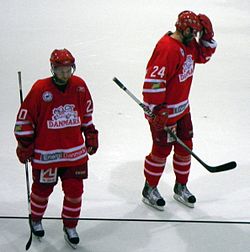 | |
| Nickname | Danish Lions |
|---|---|
| Association | Danmarks Ishockey Union |
| General manager | Morten Green |
| Head coach | Mikael Gath |
| Assistants | Andreas Lilja Morten Madsen |
| Captain | Jesper Jensen Aabo |
| Most games | Morten Green (316) |
| Most points | Jens Nielsen (241) |
| Team colors | |
| IIHF code | DEN |
 | |
| Ranking | |
| Current IIHF | 8 |
| Highest IIHF | 9 (2025) |
| Lowest IIHF | 15 (2006, 2014–15) |
| First international | |
| Canada (Stockholm, Sweden; 12 February 1949) | |
| Biggest win | |
| Denmark (Copenhagen, Denmark; 18 March 1977) | |
| Biggest defeat | |
| Canada (Stockholm, Sweden; 12 February 1949) | |
| Olympics | |
| Appearances | 1 (first in 2022 ) |
| IIHF World Championships | |
| Appearances | 57 (first in 1949 ) |
| Best result | 4th (2025) |
| International record (W–L–T) | |
| 386–501–58 | |
The Danish national men's ice hockey team is the national ice hockey team for Denmark. The team is controlled by Danmarks Ishockey Union. It was founded in 1949, and as of 2022, the Danish team was ranked 10th in the IIHF World Rankings. Denmark currently has 4,255 players (0.07% of its population). Their coach is Swedish Mikael Gath. Denmark once held the record for the largest loss when they were defeated by Canada in 1949, 47–0, only being surpassed by New Zealand who were defeated by Australia 58–0 in 1987.





